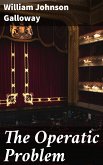In "Debussy's Pellv©as et Mv©lisande," Lawrence Gilman delves into the intricate layers of Claude Debussy'Äôs only opera, exploring its rich interplay of music and drama. Gilman employs a scholarly yet accessible literary style that dissects the psychological depth and symbolism inherent in Debussy's score, while placing it within the broader context of early 20th-century modernism. The author adeptly navigates the fragmented narrative structure and impressionistic musical language, illuminating how they challenge traditional operatic forms and reflect the ethos of the Symbolist movement. This critical examination not only enhances the reader's appreciation for the opera but also serves as a valuable addition to musicology and operatic studies. Lawrence Gilman was a prominent music critic and writer whose deep-seated passion for music and the arts profoundly influenced his critical approach. Having cultivated a rich engagement with the works of leading composers like Debussy, his expertise is evident in this text, as he artfully bridges literary criticism and musicology. Gilman's career was marked by his ability to convey complex musical ideas in an engaging manner, establishing him as a significant voice in early 20th-century music criticism. This book is highly recommended for musicians, musicologists, and anyone intrigued by the nuanced relationship between music and narrative in opera. Gilman's insightful analysis invites readers to reconsider Pellv©as et Mv©lisande not just as an operatic endeavor but as a groundbreaking artistic statement, making it essential reading for a deeper understanding of Debussy's monumental influence on the musical landscape.
Dieser Download kann aus rechtlichen Gründen nur mit Rechnungsadresse in A, B, BG, CY, CZ, D, DK, EW, E, FIN, F, GR, H, IRL, I, LT, L, LR, M, NL, PL, P, R, S, SLO, SK ausgeliefert werden.









